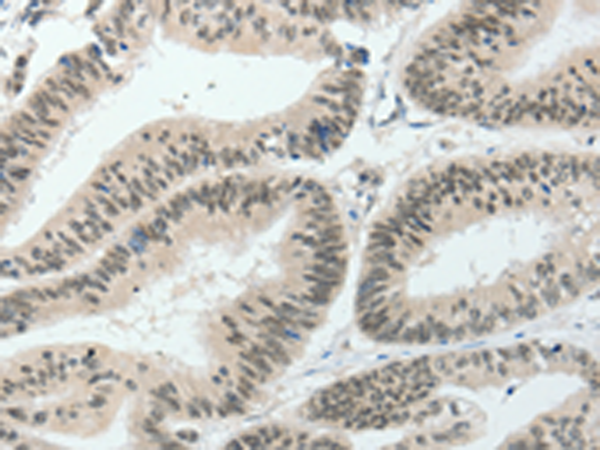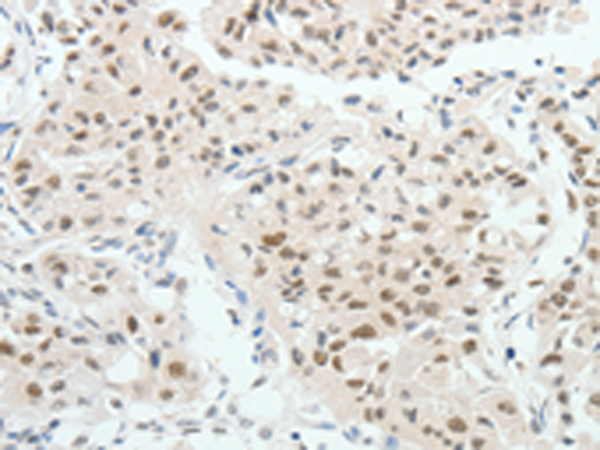

| WB | 咨询技术 | Human,Mouse,Rat |
| IF | 咨询技术 | Human,Mouse,Rat |
| IHC | 1/100-1/300 | Human,Mouse,Rat |
| ICC | 技术咨询 | Human,Mouse,Rat |
| FCM | 咨询技术 | Human,Mouse,Rat |
| Elisa | 1/2000-1/10000 | Human,Mouse,Rat |
| Aliases | FJHN; HNF2; LFB3; TCF2; HPC11; LF-B3; MODY5; TCF-2; VHNF1; HNF-1B; HNF1beta |
| Host/Isotype | Rabbit IgG |
| Antibody Type | Primary antibody |
| Storage | Store at 4°C short term. Aliquot and store at -20°C long term. Avoid freeze/thaw cycles. |
| Species Reactivity | Human, Mouse, Rat |
| Immunogen | Synthetic peptide of human HNF1B |
| Formulation | Purified antibody in PBS with 0.05% sodium azide and 50% glycerol. |
+ +
以下是关于HNF1B抗体的3篇代表性文献的简要概括:
---
1. **文献名称**:*Autoantibodies to HNF1B in type 1 diabetes and autoimmune polyendocrine syndrome*
**作者**:Kawasaki E, et al.
**摘要**:该研究首次报道在部分成人自身免疫性糖尿病(如LADA)及多腺体自身免疫综合征(APS)患者血清中检测到HNF1B自身抗体,提示其可能作为新型生物标志物,与HNF1B基因突变相关的表型(如肾发育异常)存在关联。
2. **文献名称**:*HNF1B autoantibodies in lupus nephritis: A potential marker of renal involvement*
**作者**:Frohnert PP, et al.
**摘要**:研究在系统性红斑狼疮(SLE)患者中发现HNF1B抗体阳性率显著升高,尤其在合并狼疮肾炎的病例中。抗体水平与肾脏病理活动度相关,提示其可能参与肾脏靶向自身免疫反应。
3. **文献名称**:*Novel autoantigens in autoimmune diabetes identified by protein array*
**作者**:Hiemstra HL, et al.
**摘要**:通过高通量蛋白质芯片技术筛选1型糖尿病患者的自身抗体,发现HNF1B是少数新鉴定出的靶抗原之一,但其阳性率较低(约2-3%),可能与特定亚型糖尿病或器官特异性自身免疫有关。
---
**备注**:HNF1B抗体的研究相对较少,多数文献集中于其基因突变导致的疾病(如MODY5)。上述文献侧重自身免疫机制中的抗体意义,若需扩展,可进一步探讨HNF1B抗体作为实验工具的研究(如发育生物学中的表达分析)。
HNF1B (Hepatocyte Nuclear Factor 1 Beta) is a transcription factor encoded by the *HNF1B* gene, crucial in embryonic development and tissue-specific gene regulation. It plays a key role in the formation of organs such as the kidneys, pancreas, liver, and genital tract. Mutations in *HNF1B* are linked to autosomal dominant disorders like renal cysts and diabetes syndrome (RCAD), characterized by kidney abnormalities, maturity-onset diabetes of the young (MODY), and pancreatic dysfunction.
Antibodies targeting HNF1B are primarily used in research and diagnostics to study its expression, localization, and functional roles. In research, these antibodies help identify HNF1B protein levels in tissues, aiding investigations into developmental biology and disease mechanisms. Clinically, they support the diagnosis of HNF1B-related disorders through immunohistochemistry or Western blotting of patient samples.
HNF1B antibodies also contribute to understanding cancer biology, as aberrant HNF1B expression is observed in certain cancers (e.g., ovarian, clear cell renal carcinoma). Their specificity and reliability are critical for distinguishing HNF1B from homologous proteins like HNF1A. While primarily tools for basic and translational research, these antibodies hold potential as biomarkers for personalized therapies targeting HNF1B-associated pathways.
Overall, HNF1B antibodies bridge molecular insights with clinical applications, enhancing our grasp of developmental disorders and their therapeutic avenues.
×